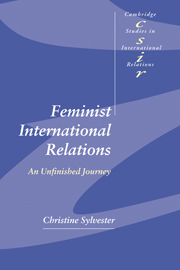14 - Internations of feminism and International Relations
Published online by Cambridge University Press: 22 September 2009
Summary
“Internations” characterizes the fulcrum/impasse/fulcrum of IR and feminismand suggests literary ways to world-travel in and around it. Ann Tickner (1997:611–612) claims that “[w]hile feminist scholars, as well as a few IR theorists, have called for conversations and dialogue across paradigms … few conversations or debates have occurred.” To her, good communication stumbles around the different ontologies and epistemologies driving the two fields and mires around gaps in the power to set dominant discourse. This concluding essay offers another spin on the issue: the two fields talk past each other because they are so very similar, and powerfully so.
IR and feminism, it can be said, are variants of the imagined nations that Benedict Anderson (1991) describes. They are nations of knowledge, identity, and practice that endeavor to incorporate a great deal of territory and to embrace all eligible members. Each “nation,” however, fails to persuade some constituencies that they are part of the enterprise and should throw in their lot with it. Feminism can be off-putting to Third World women (and postcolonial analysts such as Ien Ang (1995)), who suspect that their issues and identities will always languish in a nation that is western at its core. IR is supposedly about the vast international and its many relations but tends to leave a fair bit of both out of its nation, including feminists, all those “bottom-rung” types of whom Enloe speaks, and relations of the international that do not center on Great Power concerns.
- Type
- Chapter
- Information
- Feminist International RelationsAn Unfinished Journey, pp. 287 - 316Publisher: Cambridge University PressPrint publication year: 2001



